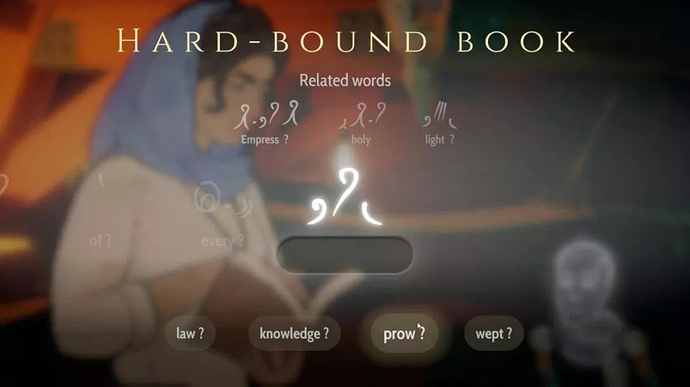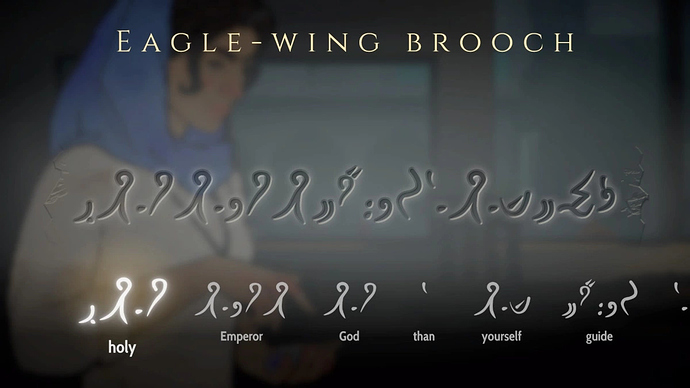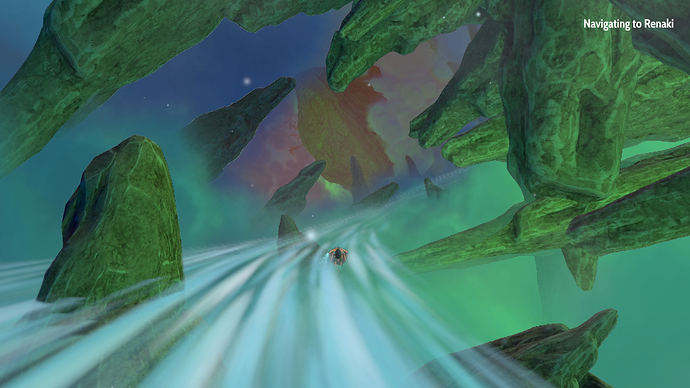Exactly! And the sequel could have been about timecube!
Yup. The only limit would be yourself.
It’s got that 2D animation method that really annoys me, where rather than create animations, you just rotate sprites.
I guess this is where this goes…
Wow! Didn’t expect it to be that positive! That’s one talented dude.
Glad I’m not the only one!
The only thing worse is coupling it with Japanese-style excessive breathing animations.
As an update on this game, I noticed Game Informer posted a New Gameplay Today video this morning. Looks cool!
Quick review of the newly released Heaven’s Vault:
UPDATE: See my summary further down the thread. I liked this early on, and have a few more misgivings about it having finished it.
This game is very good and just fascinating. It’s also sometimes weird and a little shaggy in places.
What’s really great about it is that you’re always discovering new things, even it’s just new words (which is quite satisfying). The world-building is really working for me, and other than the kinda silly looking robots, I just love the artwork, especially the characters. If you like The Last Express, you’ll love how this looks in action.
Deciphering the glyphs is fun and interesting, though the whole framework is not exactly intuitive. Still, you get used to it. It’s a little bit like solving deaths in Return of the Obra Dinn. When you find a new object with an inscription (which could be in the world, on an object you pick up or are given, or in a book you find) it shows you all the words and you go word-by-word and pick from a limited set of three or four translations for each.
It won’t tell you if you’re right. It’ll keep your guess for that word, with a question mark after it. As you see above, when you’re trying to figure out a word, it’ll show related words–ones that share characters with the word you’re looking at–that you already know or have guessed at above it. These can be handy clues. The other main clue is the general logic of the sentence, if you already know some of the other words or have good guesses for them.
The way you confirm guesses is to find inscriptions that, arbitrarily, are of a different type than the others. They’re called fragments, and for these inscriptions, you’re matching words you have guessed to sections of the phrase. When you match all the words you can, it’ll tell you either that all the words are definitely correct (at which point those ones no longer have question marks after their translations) or that one of the ones you assigned is wrong.
What’s cool is that after doing a bunch of this, I’ve got a decent idea of which individual character means “place” or “person” or means a thing is possessive, etc. I’m starting to get a grasp on numbers. It makes you feel pretty smart. At the same time, though, you feel a bit at the mercy of the inscriptions the game decides to hand you. But what’s cool is that you will find inscriptions everywhere you go, so you’re never stuck, you just might feel like you’re not moving as quickly as you’d like.
What these inscriptions do for you is help you home in on new locations to visit. Because there’s a sailing minigame that you use to get around, and a big map of “rivers” you can ride around the nebula.
Each new object you find associated with an undiscovered site narrows the window of where that place is on the map. Eventually it’s small enough that you can go there and fly around until you find it.
There’s not really a lot to sailing, and it could be a bit smoother, but it’s generally pleasant. And note that you can effectively “autopilot” somewhere by choosing to sleep in your bed and letting your robot pilot. (This was not clear to me until I just decided to see what happens when I sleep.) But you do find tiny ruins as you sail around, and each one can give you an artifact, so sailing can bring some benefits.
The upshot is that it feels like a kind of detective story where there are no dead ends. The trade-off is that many clues you find feel procedurally generated, and thus less truly significant. Like someone chopped up a puzzle piece into ten smaller puzzle pieces because you need some more busy work. But so far I’ve barely been able to put the game down, so it doesn’t feel hopeless or pointless, just granularized and computer-crafted.
You can tell that Inkle are really stretching themselves for this game. UI and level design are clearly practices they have yet to master, but I’m not finding their stabs at either to be serious burdens to play.
If the concept and the art style look interesting to you, I’d recommend this for sure. It’s odd, but fascinating.
Thanks for those that recommended Supraland. That game is amazingly good. Bought it immediately after trying the demo.
I wishlisted this yesterday, but my only restraint was that it looks quite ‘casual’, i.e. it’s easy like a lot of those hidden object games.
Is that close to the truth?
I bought it yesterday because of glowing reviews here and the John Walker article. So… it’s fine, but isn’t blowing me away or anything. It’s very nicely paced and the puzzles are interesing throughout, and the art aesthetic is decent, but the controls are way too slidey and it’s not really all that different (so far) from a dozen other puzzle/platformers. I’ll push through for a bit longer, but I’m kind of underwhelmed given the glowing reports about it.
Holy crap, everything about that sounds awesome. I’ve never heard of this before but I’m going to pick it up.
Not being snarky here, but which games come to your mind? It’s a genre I don’t know well and I have already started looking out for other games that are 3D, Metroidvania and with puzzles, combat, upgrades and secrets? I have found Hob, maybe Snake Pass, but that’s quite different, and… not much else. The Darksiders games are bit too much combat focused.
I also don’t think it’s superb, but I thought it’s quite unique… and I’m very enthusiastic about it because for me it has even gotten better over time. And yes, the pacing is good.
Thanks for the write-up, @Nightgaunt. I do love me some Inkle Studios, and this sounds awesome. Sad I can’t play it, though- probably won’t run on my Surface 5 (and I don’t really game on it, either), and don’t have a ps4. I suppose I’ll add it to the backlog of things I’ll play of the ps5 actually has backwards compatibility. Or hope it comes to Xbox someday…
The Unfinished Swan, Papa y Yo, A Story About My Uncle, Little Nightmares, and Contrast are all less well-known examples that are all pretty good and feel pretty similar to Supraland. Obviously the Portal games as well.
Thank you! Especially A Story About My Uncle seems intriguing and is news to me. I had taken Little Nightmares and Contrast for something different - good that I took a closer look now. Same goes for Papa y Yo which looks fantastic as well. I’m glad I asked and, again, thanks!
No problem. Be aware that Papa y Yo, while a fantastic game and a very competent puzzle-platformer, explicitly is a metaphor about alcoholism and an abusive parent. It’s pretty heavy subject matter, and the game is pretty emotionally fraught. I wish it were more widely known, because it’s an example of what’s possible beyond the very narrow range of narratives we usually get in interactive media.
No, I don’t think I would compare it to a hidden object game. Is it “casual”? Hard to say. I don’t think it’s a game that is about the challenge. It’s about the exploration of a story and about gradually piecing together the meaning of the glyph language. And in the major story moments, the dialogue between characters and characterization (a lot of dialogue is too procedural to be really engaging, but you learn to know which to expect when).
So, you walk your character around a 3D world and pilot your ship and make interesting dialogue choices, but there are no failure states. It’s not that kind of game. Is that casual?
Wait… that’s an Inkle game? That’s all you had to say.
Oh yeah, guys. Heaven’s Vault is the new game by Inkle, who made 80 Days and the Sorcery mobile games.


